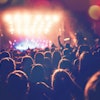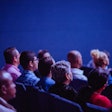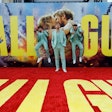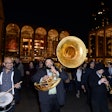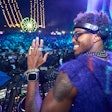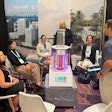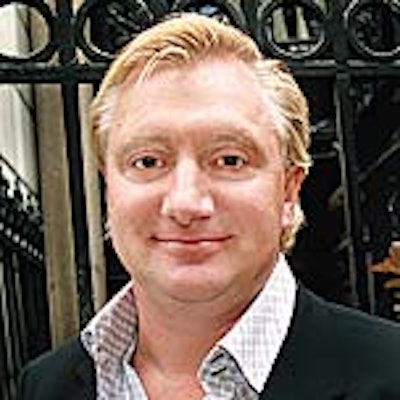
Title: Vice President of Corporate Events
What he plans: More than 600 events each year, ranging from employee motivation and education seminars, to trade show dinner parties. This past September he managed to gather 95,000 people in Central Park for a free Dave Matthews Band concert to roll out AOL 9.0— not a bad showing for a product launch.
Staff: 12
Budget: "It's a big budget. It's a healthy budget. But like everybody else, we're always trying to make it go further."
How long he’s been at AOL: Six months
Career path: "I dropped out of school. I started my career at Speedo in the European promotion and events department. I've worked for event management companies, including Catalyst Events."
Age: "I just turned 40. It was an awful, sad day. We flew to Miami and had a party. Yeah, really awful."
Favorite hor d'euvre: Chicken satay with peanut sauce.
Favorite magazines: People and Metropolitan Home
Where he grew up: Liverpool, England
Where he lives: Alexandria, Virginia
How did you put together the Dave Matthews Band concert that AOL sponsored in Central Park in September to benefit New York City schools?
We worked with the Parks department, the Mayor's office, the schools, Dave Matthews and the police to pull it together. Really our function was to keep everybody happy—we had the role of the facilitator, making sure that everybody felt important and kept moving. We had two months, so that entailed weekly meetings to make sure we were getting it all done—from the V.I.P. events, to figuring out how to get 95,000 people in and out quickly and safely, to making sure that AOL members were involved.
How did you measure the success of the event?
The main goals were to help the schools and promote the AOL brand and we achieved both of those. It was a big success and we received a lot of media coverage for it. We had originally decided not to do a launch for AOL 9.0, and although we didn’t promote the concert as a product launch, it turned into one.
Not long afterward, you had to throw together a Counting Crows concert in Boise in a week's time. How did you do it?
AOL is all about speed and the "point-and-click" mentality. We ran an ad in New York launching a product that asked, "You didn't think we'd launch something like this in Boise, did you?" The governor of Idaho complained to our CEO, so we decided that we would apologize by throwing a free concert there. We threw around ideas for a band and somebody thought about the Counting Crows, to play off of the whole "eating crow" bit. I flew to Boise and found a venue and outsourced almost everything to local vendors instead of taking my entire production team. You can work fast when employees are empowered to make decisions instead of waiting for a day for permission to sign a contract.
How has the economy affected your events this year?
Gone are the days of being flashy—you want to be classy, not flashy, which means you're not going to spend $5,000 on identical dancers outside. We try to do something nice, so that people think it's a great event instead of a waste of money.
How do you make events effective when budgets shrink?
We do a lot of events that are interactive and rely on our own resources. For instance, we just sponsored a dinner at a trade show, where we ran our own DVD of Sessions@AOL [live recordings of popular musicians and bands] and played our own Sessions@AOL CDs. The word experiential gets thrown around a lot—I guess we try to use our own resources to enhance an event to try to get people thinking differently.
Where do you find new vendors?
I have a core group of vendors that I use. I guess direct mail still works on me, because if I see a nice piece of direct mail I will call the vendor to find out more.
How do you convince others that events are still important?
People can see the value in an event because we've put a lot of thought into its content. For us it's always about pushing AOL.
What do today's guests expect at an event?
If we're throwing a party or doing a launch, people expect to be entertained. If they put the time into being there, they want to know what the "wow" is and what we're going to show them.
How are guests' expectations changing?
I don't think they are. They're still rude, though. I'd say that one out of every 10 people is still behaving badly, like spoiled brats.
What trends are you seeing in event style?
People are being more minimalist. They're using a lot of lights instead of big, hefty props. I'd say that the venues themselves are the main props now and people are using things like lights and table linens to add to it.
What is your budget challenge right now?
I don't have one. I have a budget and stick to it to make it work. We have a great group of people in the department, so if we have to do an event for $60 a head, they always seem to make it work.
Is the definition of a successful event changing? How do you measure an event’s success?
We just do so many, it depends on what kind of event it is. Did we get a lot of people to sign up for AOL? Did we push the brand? I don't think how we define success has changed.
How has technology affected the way you plan events?
Everything we do has a technology element to it. Like when guests check in, we use scanners instead of guest lists. Lists are so 1997. The invitation is usually an email. Because of who we are, everything has to be cutting edge.
What event are you looking forward to in the next year?
We are working with the NFL to do something at the Super Bowl. We'll be in Houston for a couple of weeks figuring out what it is. We're also planning my son's fifth birthday party. I guess I'll get a goat or a rabbit or something and have 10 five-year-olds over, which will be harder to pull off than anything we do at the Super Bowl.
—Erin Strout
What he plans: More than 600 events each year, ranging from employee motivation and education seminars, to trade show dinner parties. This past September he managed to gather 95,000 people in Central Park for a free Dave Matthews Band concert to roll out AOL 9.0— not a bad showing for a product launch.
Staff: 12
Budget: "It's a big budget. It's a healthy budget. But like everybody else, we're always trying to make it go further."
How long he’s been at AOL: Six months
Career path: "I dropped out of school. I started my career at Speedo in the European promotion and events department. I've worked for event management companies, including Catalyst Events."
Age: "I just turned 40. It was an awful, sad day. We flew to Miami and had a party. Yeah, really awful."
Favorite hor d'euvre: Chicken satay with peanut sauce.
Favorite magazines: People and Metropolitan Home
Where he grew up: Liverpool, England
Where he lives: Alexandria, Virginia
How did you put together the Dave Matthews Band concert that AOL sponsored in Central Park in September to benefit New York City schools?
We worked with the Parks department, the Mayor's office, the schools, Dave Matthews and the police to pull it together. Really our function was to keep everybody happy—we had the role of the facilitator, making sure that everybody felt important and kept moving. We had two months, so that entailed weekly meetings to make sure we were getting it all done—from the V.I.P. events, to figuring out how to get 95,000 people in and out quickly and safely, to making sure that AOL members were involved.
How did you measure the success of the event?
The main goals were to help the schools and promote the AOL brand and we achieved both of those. It was a big success and we received a lot of media coverage for it. We had originally decided not to do a launch for AOL 9.0, and although we didn’t promote the concert as a product launch, it turned into one.
Not long afterward, you had to throw together a Counting Crows concert in Boise in a week's time. How did you do it?
AOL is all about speed and the "point-and-click" mentality. We ran an ad in New York launching a product that asked, "You didn't think we'd launch something like this in Boise, did you?" The governor of Idaho complained to our CEO, so we decided that we would apologize by throwing a free concert there. We threw around ideas for a band and somebody thought about the Counting Crows, to play off of the whole "eating crow" bit. I flew to Boise and found a venue and outsourced almost everything to local vendors instead of taking my entire production team. You can work fast when employees are empowered to make decisions instead of waiting for a day for permission to sign a contract.
How has the economy affected your events this year?
Gone are the days of being flashy—you want to be classy, not flashy, which means you're not going to spend $5,000 on identical dancers outside. We try to do something nice, so that people think it's a great event instead of a waste of money.
How do you make events effective when budgets shrink?
We do a lot of events that are interactive and rely on our own resources. For instance, we just sponsored a dinner at a trade show, where we ran our own DVD of Sessions@AOL [live recordings of popular musicians and bands] and played our own Sessions@AOL CDs. The word experiential gets thrown around a lot—I guess we try to use our own resources to enhance an event to try to get people thinking differently.
Where do you find new vendors?
I have a core group of vendors that I use. I guess direct mail still works on me, because if I see a nice piece of direct mail I will call the vendor to find out more.
How do you convince others that events are still important?
People can see the value in an event because we've put a lot of thought into its content. For us it's always about pushing AOL.
What do today's guests expect at an event?
If we're throwing a party or doing a launch, people expect to be entertained. If they put the time into being there, they want to know what the "wow" is and what we're going to show them.
How are guests' expectations changing?
I don't think they are. They're still rude, though. I'd say that one out of every 10 people is still behaving badly, like spoiled brats.
What trends are you seeing in event style?
People are being more minimalist. They're using a lot of lights instead of big, hefty props. I'd say that the venues themselves are the main props now and people are using things like lights and table linens to add to it.
What is your budget challenge right now?
I don't have one. I have a budget and stick to it to make it work. We have a great group of people in the department, so if we have to do an event for $60 a head, they always seem to make it work.
Is the definition of a successful event changing? How do you measure an event’s success?
We just do so many, it depends on what kind of event it is. Did we get a lot of people to sign up for AOL? Did we push the brand? I don't think how we define success has changed.
How has technology affected the way you plan events?
Everything we do has a technology element to it. Like when guests check in, we use scanners instead of guest lists. Lists are so 1997. The invitation is usually an email. Because of who we are, everything has to be cutting edge.
What event are you looking forward to in the next year?
We are working with the NFL to do something at the Super Bowl. We'll be in Houston for a couple of weeks figuring out what it is. We're also planning my son's fifth birthday party. I guess I'll get a goat or a rabbit or something and have 10 five-year-olds over, which will be harder to pull off than anything we do at the Super Bowl.
—Erin Strout

